It’s mango season: make mango sticky rice at home
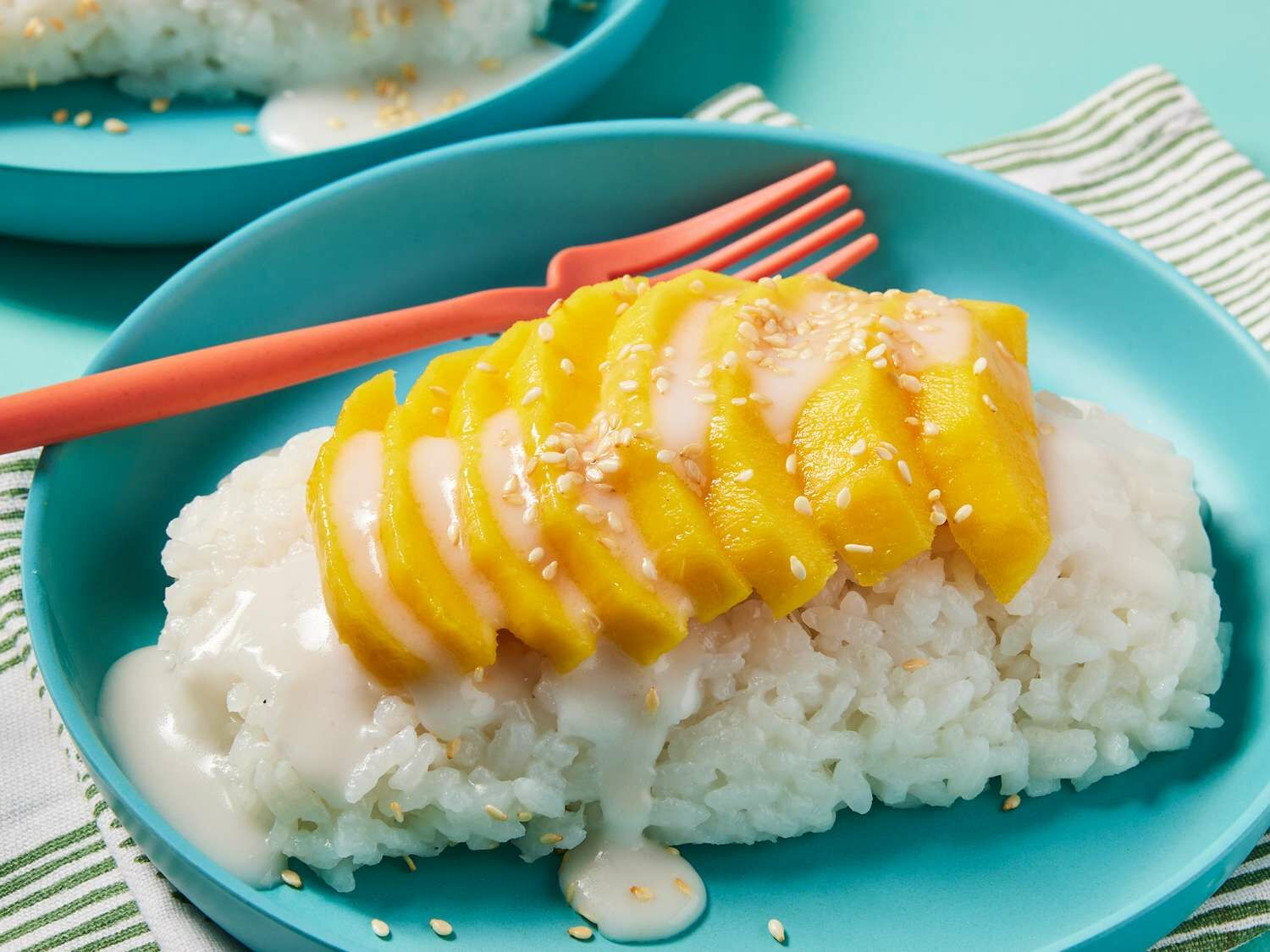
It’s mango season, time to devour our faces in Thailand’s delicious mangoes! Now get your mangoes, get some coconut milk, and make one of Thailand’s traditional desserts: Mango Sticky Rice
Ingredients Required
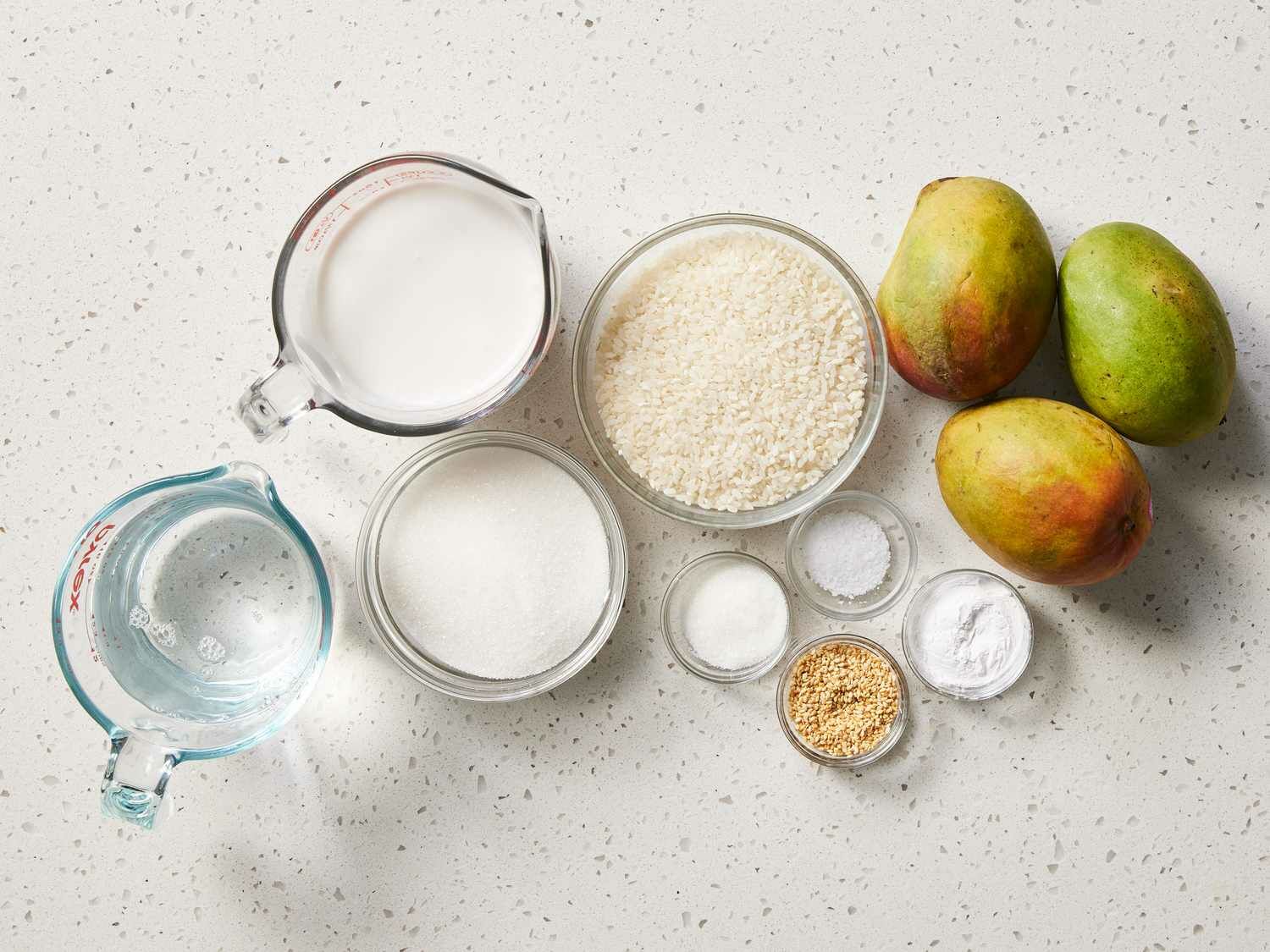
- Thai Sticky Rice (aka sweet rice or glutinous rice) – avoid jasmine rice or basmati rice
- Ripe yellow mangoes (Nam Doc Maor or Ataulfo) – select the ones that are a little soft when squeezed, indicating a soft and juicy texture inside
For the coconut sauce:
-
Coconut milk (1 cup or 237 ml) – choose full-fat coconut milk for a rich and creamy texture
-
Granulated sugar (⅓ cup or 65 g) – just to adjust the sweetness preference
-
Salt (½ teaspoon) – a pinch intensifies the sweetness
-
Cornstarch (½ teaspoon) – thickens the sauce to a desirable consistency.
Tools and Equipment Needed
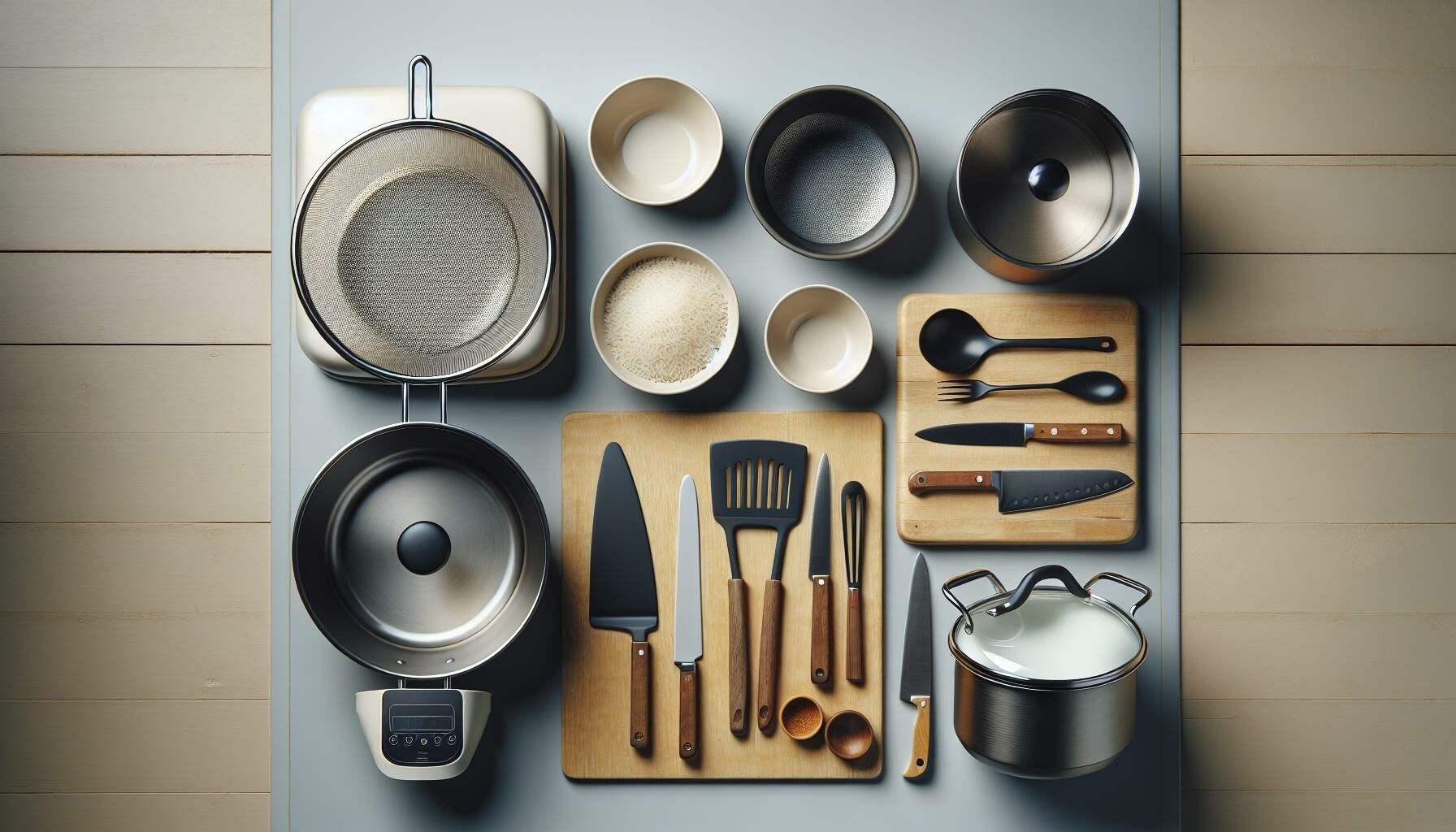
- Measuring Cups and Spoons: These are for preparing the ingredients as they ensure they accurately maintain the balance of the flavours of the dessert.
- Mesh Sieve: Used for draining rice following its rinsing process.
- Rice cooker or steamer: To cook the sticky rice.
- Saucepan: To heat the ingredients for the coconut sauce.
- Small bowl: This is designated for the cornstarch, which serves to thicken the sauce.
- Medium bowl: To cool the coconut sauce once prepared.
- Mixing bowl: To mix the sticky rice and coconut sauce.
- Spatula or Wooden Spoon: For mixing the coconut sauce and also for mixing the sticky rice and coconut sauce.
- Mango Slicer or Knife and Cutting Board: To prepare the mango.
1. Preparing the Sticky Rice

Soaking the Rice
-
Rinse the rice by placing it in a bowl or rice cooker bowl then swirl your hand to wash
-
Drain the water
-
Repeat rinsing and draining about three to four times until the water is clear
TIP: You can soak the rice for at least four hours or overnight in room temperature water for the best results. This facilitates the softening and taste absorption of the rice grains.
Cooking the Rice
-
Once you have soaked the rice, drain the rice by using a mesh sieve. Make sure all excess water is removed to prevent it from becoming mushy
-
Transfer the drained rice to a cheesecloth or clean kitchen cloth
-
Spread an even layer to allow steam to pass through it more effectively
-
Wrap and cover the rice with cheesecloth or clean kitchen cloth
-
Steam the rice in a rice cooker or steamer for about 20 minutes
TIP: The success of the rice lies in its sticky texture. Hard rice is a sign of not enough time spent cooking or soaking. After soaking for six hours, steam until soft. Too much water or excessive soaking may be the cause of soft rice. Cut down on the soaking period.
2. Making the Coconut Sauce

Follow these steps to achieve a smooth and luscious coconut sauce:
-
Combine Ingredients: In the saucepan, combine the coconut milk, sugar, and salt. Keep the heat medium to prevent burning the mixture.
-
Heat Mixture: Stir consistently until the sugar dissolves. This usually takes about 5 minutes.
-
Thicken Sauce: In a small bowl, combine the cornflour and add a tablespoon of water to form a slurry. To prevent lumps, gradually add this to the saucepan while whisking constantly.
-
Final Simmer: Simmer for a further two minutes, or until the sauce starts to get a little thicker. Make sure it pours easily but coat the back of a spoon.
-
Cool Down: Take the heat off and move the sauce into a medium bowl for cooling. As it cools, it gets even thicker, making it the ideal consistency to pour over the mango and sticky rice.
TIP: The coconut sauce should be creamy and pourable, not too thick or thin. If too runny, simmer longer to reduce and thicken. If too thick, add thin coconut milk or water gradually to achieve the desired consistency.
3. Mixing the sticky rice and coconut sauce
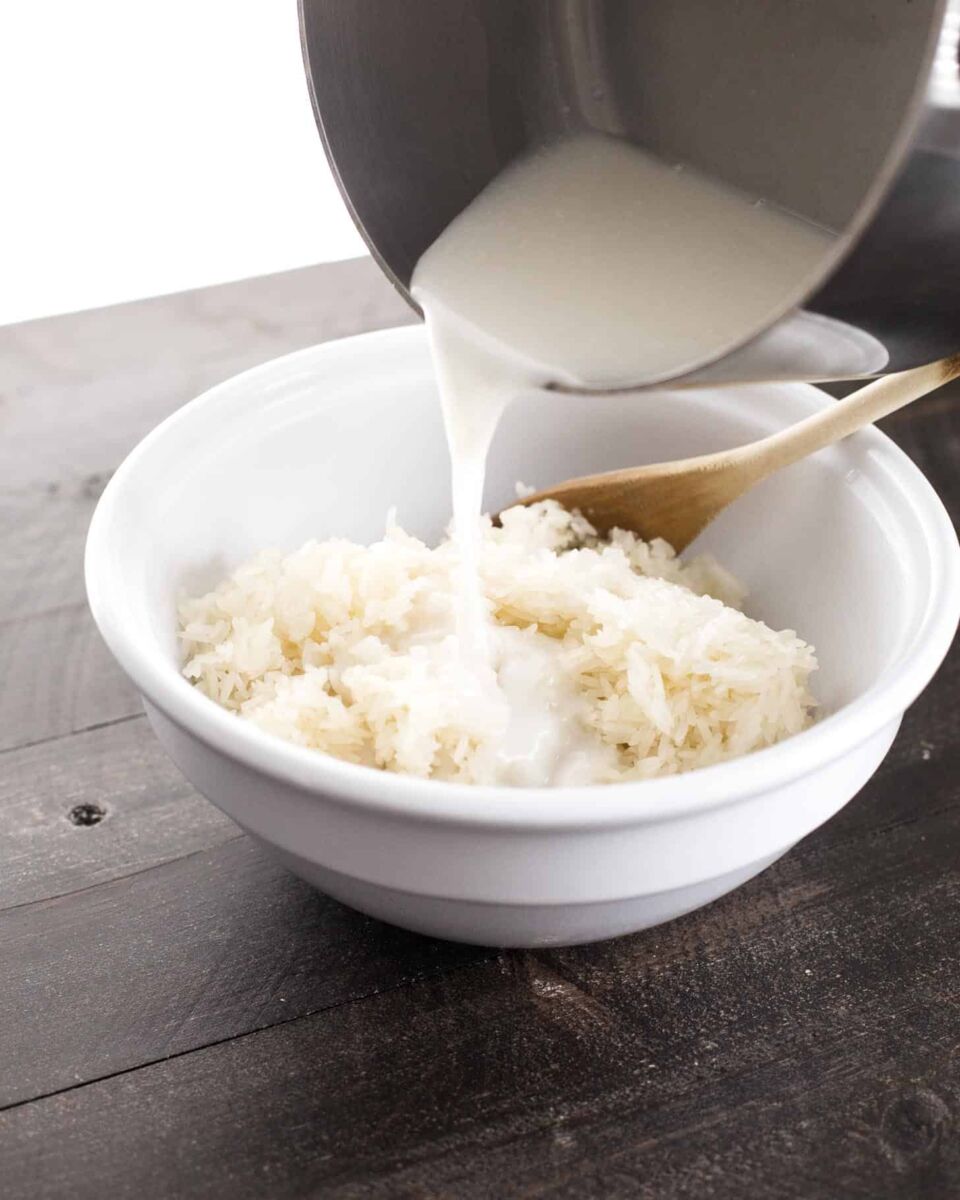
- Add the sticky rice to your mixing bowl
- Use half or any measurement to your liking of the coconut sauce and pour it into the rice
- Mix it
4. Preparing the Mango

After you have added the sticky rice and coconut sauce together, attention turns to the mango, a key component that adds freshness and sweetness to the dish.
How to Cut Mangoes
-
Peel the skin off gently mango slicer or knife
-
Cut the mango in half from the seed
-
Place the mango on a cutting board
-
Cut into diagonal slices
TIP: Selecting and preparing mangoes is crucial for the dish, with ripe ones providing a soft texture. If unripe, leave it at room temperature. Cut mangoes uniformly along the central pit, scooping out flesh, and ensuring a harmonious balance with the sticky rice and coconut sauce.
5. Assembling Mango Sticky Rice
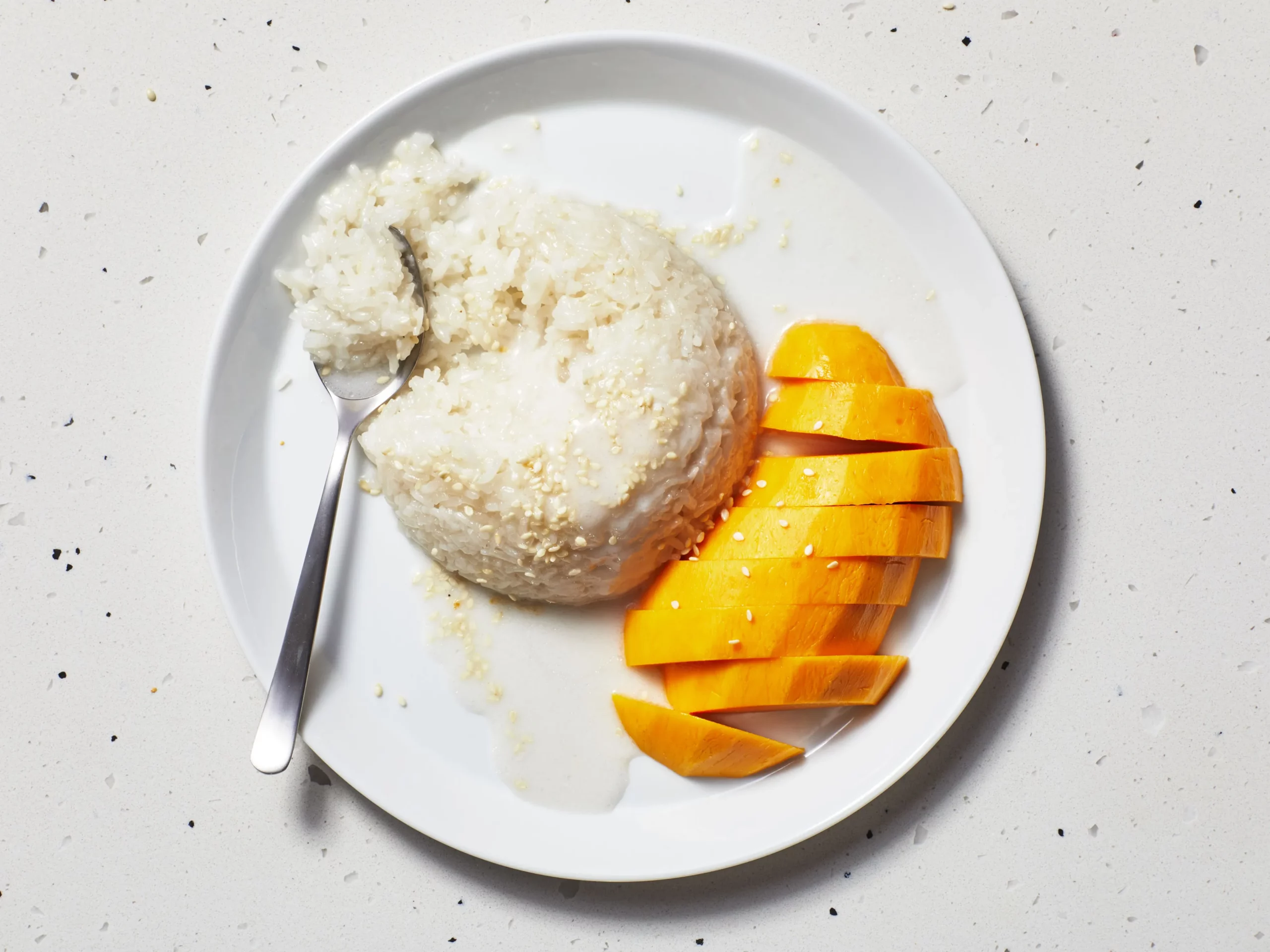
Once you have your creamy coconut sauce and ripe mangoes ready, the assembly of Mango Sticky Rice transforms these individual components into a delightful dish.
Layering Techniques
-
Prepare the Base: Begin by placing a scoop of warm sticky rice in the centre of a serving dish. Make sure the rice is fluffy and evenly distributed to create a solid foundation.
-
Add the Mango: Arrange the mango pieces artfully around the bed of rice, ensuring each serving has a generous amount of fruit.
-
Drizzle coconut sauce: Pour a liberal amount of coconut sauce over the sticky rice, allowing it to seep into and around the rice for maximum flavour.
-
Garnish Wisely: Toss some sesame seeds or a few mint leaves into the meal to give it some colour and a hint of freshness. These little touches improve the dessert’s appearance in addition to its taste.
-
Portion Appropriately: Consider the portion size to ensure it is sufficient for one person. A visually balanced and not overly heaped plate invites enjoyment.
-
Serve Immediately!: Mango Sticky Rice is best enjoyed fresh. Serve it as soon as you assemble it to savour the textures and flavours at their best.
Savour the traditional Mango Sticky Rice and enjoy the mango season! Discover the wide variety of delicious fruits that are available in Thailand; each one has a distinct taste and texture.
Latest Thailand News
Follow The Thaiger on Google News:


























